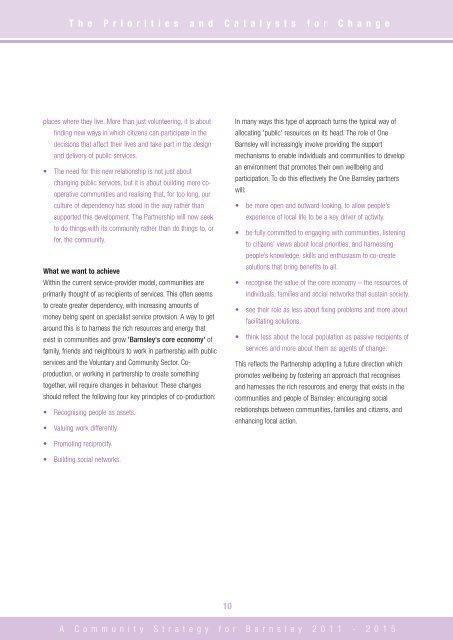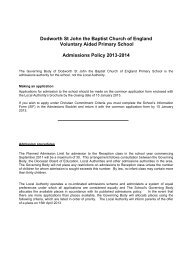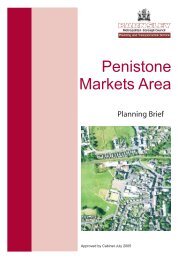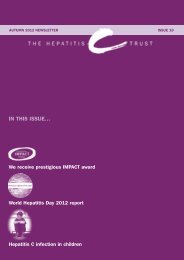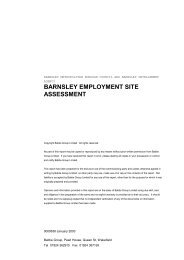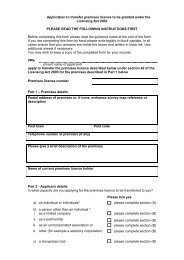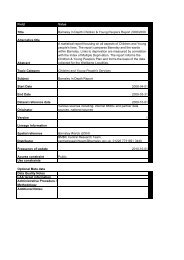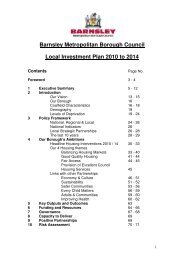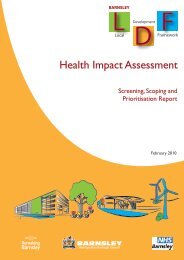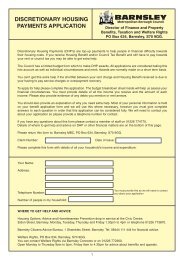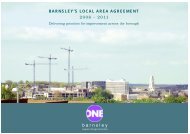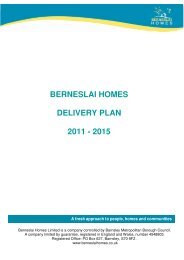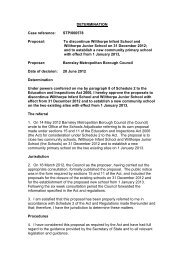A Community Strategy for Barnsley 2011 - 2015 - Barnsley Council ...
A Community Strategy for Barnsley 2011 - 2015 - Barnsley Council ...
A Community Strategy for Barnsley 2011 - 2015 - Barnsley Council ...
You also want an ePaper? Increase the reach of your titles
YUMPU automatically turns print PDFs into web optimized ePapers that Google loves.
The Priorities and Catalysts <strong>for</strong> Change<br />
places where they live. More than just volunteering, it is about<br />
finding new ways in which citizens can participate in the<br />
decisions that affect their lives and take part in the design<br />
and delivery of public services.<br />
• The need <strong>for</strong> this new relationship is not just about<br />
changing public services, but it is about building more cooperative<br />
communities and realising that, <strong>for</strong> too long, our<br />
culture of dependency has stood in the way rather than<br />
supported this development. The Partnership will now seek<br />
to do things with its community rather than do things to, or<br />
<strong>for</strong>, the community.<br />
What we want to achieve<br />
Within the current service-provider model, communities are<br />
primarily thought of as recipients of services. This often seems<br />
to create greater dependency, with increasing amounts of<br />
money being spent on specialist service provision. A way to get<br />
around this is to harness the rich resources and energy that<br />
exist in communities and grow '<strong>Barnsley</strong>'s core economy' of<br />
family, friends and neighbours to work in partnership with public<br />
services and the Voluntary and <strong>Community</strong> Sector. Coproduction,<br />
or working in partnership to create something<br />
together, will require changes in behaviour. These changes<br />
should reflect the following four key principles of co-production:<br />
• Recognising people as assets.<br />
• Valuing work differently.<br />
In many ways this type of approach turns the typical way of<br />
allocating 'public' resources on its head. The role of One<br />
<strong>Barnsley</strong> will increasingly involve providing the support<br />
mechanisms to enable individuals and communities to develop<br />
an environment that promotes their own wellbeing and<br />
participation. To do this effectively the One <strong>Barnsley</strong> partners<br />
will:<br />
• be more open and outward-looking, to allow people’s<br />
experience of local life to be a key driver of activity.<br />
• be fully committed to engaging with communities, listening<br />
to citizens’ views about local priorities, and harnessing<br />
people’s knowledge, skills and enthusiasm to co-create<br />
solutions that bring benefits to all.<br />
• recognise the value of the core economy – the resources of<br />
individuals, families and social networks that sustain society.<br />
• see their role as less about fixing problems and more about<br />
facilitating solutions.<br />
• think less about the local population as passive recipients of<br />
services and more about them as agents of change.<br />
This reflects the Partnership adopting a future direction which<br />
promotes wellbeing by fostering an approach that recognises<br />
and harnesses the rich resources and energy that exists in the<br />
communities and people of <strong>Barnsley</strong>: encouraging social<br />
relationships between communities, families and citizens, and<br />
enhancing local action.<br />
• Promoting reciprocity.<br />
• Building social networks.<br />
10<br />
A <strong>Community</strong> <strong>Strategy</strong> <strong>for</strong> <strong>Barnsley</strong> <strong>2011</strong> - <strong>2015</strong>


